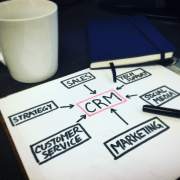12 Reasons Why Your CRM Fails…and How to Fix Them
Customer Relationship Management (CRM) systems are worth the investment and what makes it a must-have resource. However, the price tag and the time/dedication aren’t so attractive. More so, the “horror” stories we hear from failed implementations may make a manager sway back and forth before making such a huge decision. But the bright side to that is there are success stories and companies who are striving because of their CRM systems. Jennifer Karpus-Romain from Business2Community shares how we can learn from these successful implementations by fixing the common fails associated with CRM. Below are Karpus-Romain’s 12 most common reasons that a CRM fails, and how to fix them.
- Lack of user adoption – Maybe the CRM isn’t integrating well with existing workflows and processes, or your employees are just confused. This situation can often be avoided by bringing end users into the design and user-experience testing processes, and by enhancing CRM training.
- Lack of vision – If you don’t have a clear vision of what you need to utilize your CRM for to accomplish goals, you can lose focus and implementation may turn disastrous. The more specific your plans are for what your CRM will do for your company, the better.
- Thinking it’s just a technology solution – The technology alone can’t improve those relationships. CRM requires proper collaboration with the user and software to generate powerful results.
- Poor planning – Every moment invested in planning serves to prevent later confusion and frustration, ultimately helping to prevent a CRM failure.
- Lack of support – In order for your CRM system to have its best success, everyone involved with the process needs to be on board. The better their understanding of the value the CRM brings to the company, the more invested they will become in its long-term success.
- Choosing the wrong software or vendor – Choosing the right partner is important to your success, but so is selecting the right software. A true CRM partner will always build a customized solution that fits your needs.
- Too many bells and whistles – A great CRM provides a lean user experience, only making use of those elements which are absolutely necessary. The more intuitive and streamlined the user experience, the better the user adoption rate.
- No measurable objectives – Your CRM project needs clear, measurable objectives that can be easily tracked, analyzed, and evaluated. This allows you to make timely changes to the CRM itself, workflows, and even training long before the CRM is at risk of failure.
- Not thinking of customer perspective – If your CRM is failing, it’s worth taking a step back to see how your customers (usually through your employees) interact with your CRM. You may find some surprising disconnects, roadblocks, and other frustrations that are only obvious when you work backwards from the customer’s experience.
- Failing to involve end users – Design your CRM around the needs of the people who will use it most – end users. By bringing these end users into the planning and user-testing stages, these headaches and costs can often be avoided completely.
- CRM is considered a one-time thing – A great CRM isn’t the result of a single, perfectly executed implementation. Ongoing refinements, revisions, and expansions lead to success.
- Attempting the process alone – A CRM system can catapult your company’s efficiency if you implement it properly. The best way to do that is to partner with a customer relationship management software expert to ensure you are engaging your employees and getting the most from your investment.
Whether you’re in the process of implementing a CRM system or reevaluating the current strategy you have now, keep these tips in mind and you’ll be on your way to a successful path.


